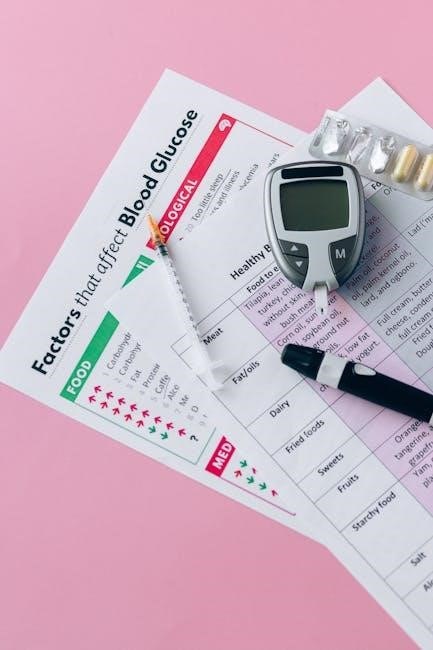Overview of the 7-Day Metabolism Diet
The 7-day metabolism diet aims to reset and boost your metabolism through specific meal plans. This approach often involves consuming lean proteins‚ vegetables‚ fruits‚ whole grains‚ and healthy fats to optimize metabolic function.
Understanding Metabolism and Weight Loss
Metabolism is the process by which your body converts food and drinks into energy. A faster metabolism can lead to more efficient calorie burning‚ aiding in weight loss. Several factors influence metabolism‚ including age‚ gender‚ genetics‚ and activity level.
Weight loss occurs when you burn more calories than you consume. Diets that boost metabolism can help create this calorie deficit. However‚ sustainable weight loss requires long-term lifestyle changes‚ not just short-term dietary adjustments.
Understanding how your body processes food is crucial for effective weight management. Focusing on whole‚ unprocessed foods and regular exercise can significantly impact your metabolic rate and overall health. Remember that individual responses to dietary changes can vary‚ so it’s essential to find an approach that works best for you.
Some diets claim to “reset” your metabolism‚ but it’s more about optimizing its function through healthy habits.
Key Principles of a 7-Day Metabolism Diet
A 7-day metabolism diet typically revolves around several core principles designed to optimize your body’s fat-burning capabilities. Firstly‚ prioritizing whole‚ unprocessed foods is crucial‚ focusing on lean proteins‚ an abundance of vegetables‚ and fruits.
Secondly‚ regular meal timing is often emphasized‚ suggesting eating every 3-4 hours to maintain stable blood sugar levels and prevent overeating. These diets usually advocate for avoiding processed sugars‚ unhealthy fats‚ and refined carbohydrates.
Hydration is also a key component‚ with ample water intake encouraged throughout the day. Many versions incorporate specific food combinations believed to enhance metabolic processes. For example‚ combining protein and healthy fats at each meal is considered important.
Finally‚ some 7-day plans incorporate exercise‚ including both cardio and strength training‚ to further boost metabolism. Overall‚ these principles aim to create a short-term dietary shift that supports metabolic function and promotes weight loss.

Sample 7-Day Meal Plan for Fast Metabolism
A sample 7-day plan includes balanced meals with lean protein‚ complex carbohydrates‚ and healthy fats. It emphasizes timing and portion control to optimize metabolism throughout the week. Consult professionals for tailored plans.
Breakfast Examples
Breakfast is a crucial part of jumpstarting your metabolism each day. On a 7-day metabolism boosting diet‚ breakfast should be nutrient-rich and provide sustained energy. Consider options like oatmeal with berries and nuts‚ providing fiber and healthy fats. Another excellent choice is a protein-packed smoothie made with fruits‚ vegetables‚ and protein powder. You might also enjoy eggs with whole-wheat toast and avocado for a balanced meal.
Greek yogurt with granola and a drizzle of honey can also be a satisfying and metabolism-friendly breakfast. Include a variety of fruits and vegetables to ensure you are getting essential vitamins and minerals. Remember to drink plenty of water to stay hydrated and support your metabolic processes. These breakfast examples aim to kickstart your metabolism and keep you feeling full and energized throughout the morning.
Lunch Examples
Lunch should continue to support your metabolism with a balance of protein‚ carbohydrates‚ and healthy fats. A salad with grilled chicken or fish‚ plenty of vegetables‚ and a light vinaigrette dressing is an excellent option. Another great choice is a turkey or avocado sandwich on whole-grain bread‚ paired with a side of fruit or a small salad.
Leftovers from dinner can also make a convenient and healthy lunch. For example‚ you might enjoy a portion of lentil soup or a serving of baked chicken with steamed vegetables. Consider including foods rich in fiber to promote satiety and help regulate blood sugar levels. A hearty quinoa salad with beans‚ vegetables‚ and a lemon-herb dressing is another nutritious and metabolism-boosting lunch option. Remember portion control to maintain a healthy calorie intake. These lunch examples are designed to keep your metabolism active and provide sustained energy throughout the afternoon.
Dinner Examples
Dinner is crucial for continuing to fuel your metabolism overnight. Opt for lean proteins paired with plenty of non-starchy vegetables. Baked salmon with asparagus and a side of quinoa is a fantastic choice‚ providing omega-3 fatty acids and sustained energy. Another great option is grilled chicken breast with steamed broccoli and a small portion of brown rice.
For vegetarians‚ lentil soup with a side salad or a tofu stir-fry with mixed vegetables are excellent choices. Remember to include healthy fats‚ such as avocado or olive oil‚ in your dinner. Portion control is essential to avoid overeating before bedtime. A lean turkey breast with roasted sweet potatoes and green beans is another satisfying and metabolism-boosting dinner option. Eating a well-balanced dinner supports muscle repair and helps regulate blood sugar levels while you sleep. The goal is to provide nutrients for your body to recover and maintain a healthy metabolic rate.

Foods to Include in a 7-Day Metabolism Boosting Diet
Focus on lean proteins‚ vegetables‚ fruits‚ whole grains‚ and healthy fats. These foods provide essential nutrients and support a healthy metabolism‚ aiding in weight loss and overall well-being during the diet.
Lean Proteins
Lean proteins are crucial for boosting metabolism during a 7-day diet. These proteins require more energy to digest‚ leading to a higher thermic effect of food and increased calorie burn. Incorporating lean protein sources helps preserve muscle mass‚ which is essential for maintaining a healthy metabolic rate.
Excellent choices include chicken breast‚ turkey‚ fish (such as salmon and tuna)‚ and lean cuts of beef. Plant-based options like beans‚ lentils‚ and tofu are also beneficial. Aim to include a source of lean protein in every meal to support metabolism and satiety.
Consuming adequate protein can also help regulate blood sugar levels‚ preventing energy crashes and promoting stable energy throughout the day. Prioritizing lean protein ensures that your body has the necessary building blocks for repair and growth‚ further enhancing metabolic function.
Vegetables and Fruits
Incorporating a wide variety of vegetables and fruits is essential for a successful 7-day metabolism-boosting diet. These foods are packed with vitamins‚ minerals‚ and antioxidants‚ which support overall health and metabolic function; They are also naturally low in calories and high in fiber‚ promoting satiety and aiding in weight management.
Focus on colorful options like leafy greens‚ berries‚ citrus fruits‚ and cruciferous vegetables. These choices provide a diverse range of nutrients and help combat inflammation‚ which can hinder metabolic processes. The fiber content in vegetables and fruits also supports healthy digestion and nutrient absorption‚ further enhancing metabolism.
Aim to include vegetables and fruits in every meal and snack to maximize their metabolic benefits. Their natural sugars provide energy without causing drastic blood sugar spikes‚ and their high water content helps keep you hydrated‚ which is vital for optimal metabolic function.
Whole Grains and Healthy Fats
Whole grains and healthy fats play a crucial role in supporting a healthy metabolism during a 7-day diet plan. Whole grains‚ unlike refined grains‚ are rich in fiber‚ which aids in regulating blood sugar levels and promoting sustained energy. This prevents energy crashes and supports a more stable metabolic rate throughout the day.
Choose options like quinoa‚ brown rice‚ oats‚ and whole-wheat bread in moderation. These provide essential nutrients and contribute to feelings of fullness‚ helping to control appetite and prevent overeating. Healthy fats‚ such as those found in avocados‚ nuts‚ seeds‚ and olive oil‚ are also vital for hormone production and nutrient absorption‚ both of which are essential for a well-functioning metabolism.
Include these fats in your diet in appropriate portions to support overall health and enhance the body’s ability to burn fat for energy. A balanced intake of whole grains and healthy fats can contribute to a more efficient and effective metabolism.

Foods to Avoid for Optimal Metabolism
To maximize the benefits of a 7-day metabolism diet‚ it’s crucial to avoid certain foods that can hinder metabolic processes. Refined carbohydrates‚ such as white bread‚ pastries‚ and sugary cereals‚ should be limited due to their rapid impact on blood sugar levels‚ leading to energy crashes and increased fat storage. Processed foods‚ often high in unhealthy fats‚ sodium‚ and artificial additives‚ can also negatively affect metabolism and overall health.
Sugary drinks‚ including sodas and fruit juices‚ provide empty calories and contribute to insulin resistance‚ a condition that impairs metabolic function. Alcohol consumption should be minimized‚ as it can interfere with fat burning and disrupt hormonal balance.
Additionally‚ it’s advisable to avoid or reduce the intake of saturated and trans fats‚ commonly found in fried foods and processed snacks. These fats can contribute to inflammation and insulin resistance‚ hindering metabolic efficiency. By eliminating these detrimental foods‚ you can create a more favorable environment for boosting your metabolism and achieving your health goals.
Exercise and Metabolism: A 7-Day Plan
Incorporating exercise into a 7-day metabolism plan is crucial for maximizing results. A balanced approach combining cardio and strength training can significantly boost metabolic rate and promote fat burning. Aim for at least 30 minutes of moderate-intensity cardio most days‚ such as running‚ cycling‚ or swimming‚ to elevate heart rate and calorie expenditure. Incorporate vigorous cardio on at least one day.
Strength training is essential for building muscle mass‚ which increases resting metabolic rate. Focus on compound exercises like squats‚ lunges‚ and push-ups‚ targeting major muscle groups. Include 2-3 strength training sessions per week‚ allowing for rest and recovery between workouts.
Consider incorporating high-intensity interval training (HIIT) for short bursts of intense exercise followed by brief recovery periods. HIIT can be highly effective for boosting metabolism and burning calories in a short amount of time. Remember to listen to your body‚ stay hydrated‚ and adjust the intensity and duration of workouts as needed.

Potential Benefits and Risks of the Diet
The 7-day metabolism diet offers potential benefits such as weight loss‚ increased energy levels‚ and improved metabolic function. By focusing on whole‚ unprocessed foods and regular exercise‚ individuals may experience a boost in their overall health and well-being. The diet’s emphasis on lean proteins‚ vegetables‚ and fruits can contribute to better nutrient intake and reduced cravings for unhealthy foods.
However‚ it’s essential to consider the potential risks associated with rapid dietary changes. Some individuals may experience fatigue‚ irritability‚ or digestive issues during the initial days of the diet. It is important to consult with a healthcare professional before starting any new diet‚ especially if you have underlying health conditions or are taking medications.
Additionally‚ strict adherence to a restrictive diet may not be sustainable for everyone in the long term. It’s crucial to approach the diet with a balanced perspective‚ focusing on making gradual‚ sustainable lifestyle changes rather than seeking quick fixes.
Long-Term Sustainability and Maintenance
The 7-day metabolism diet can be a helpful jumpstart‚ but long-term success hinges on adopting sustainable habits. Transitioning from the strict 7-day plan to a more flexible‚ balanced eating approach is crucial. Focus on incorporating the diet’s principles into your daily life‚ such as prioritizing whole foods‚ lean proteins‚ and regular physical activity.
Maintenance involves finding a calorie intake that supports your activity level and goals. Regularly monitor your weight and adjust your diet as needed. It’s also essential to develop strategies for managing cravings and navigating social situations where unhealthy food choices may be tempting.
Remember that sustainable weight management is a journey‚ not a destination. Be patient with yourself‚ celebrate small victories‚ and don’t be discouraged by occasional setbacks. Focus on creating a healthy lifestyle that you can maintain for years to come‚ rather than relying on short-term fixes.

